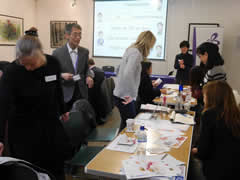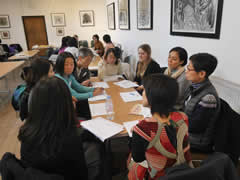Work as an Japanese-Language Chief Advisor Overseas
The Japan Foundation, London
NETSU Makoto
The Japan Foundation, London (hereinafter “JF London”) is one of the 24 overseas offices operated by The Japan Foundation (hereinafter “JF”), tasked with carrying out numerous programs to promote Japanese-language education throughout the UK.
According to the Survey on Japanese-Language Education Abroad 2015, the number of people learning Japanese at UK educational institutions increased from approximately 15,000 in 2012, when the previous survey was held, to 20,000, and the number of institutions also rose from 308 to 364. One of the main reasons for this was that foreign languages became a compulsory part of primary education in England. But that reason is not simply that the change in curriculum caused an automatic increase in learners and educational institutions. In this report, I will introduce some of the programs of JF London to promote the Japanese-language, such as the ongoing support for existing local teachers and encouraging educational institutions to adopt Japanese classes, as well as the role of the Japanese-Language Chief Advisor, including the assignment of Japanese-Language Specialists.
The First Requirement is Teachers and Materials
The first requirements in the classroom are the teacher and the teaching materials. JF London has held a series of “Primary Education Resource Sharing Workshops” to offer “examples of Japanese-language class plans” and teaching materials, allowing teachers to practice the use thereof. Participating teachers were also able to share their own approaches to using the materials to each other during the workshop. There are no officially designated textbooks, and classes take a variety of formats, such as something similar to extracurricular activities, so the workshops served as a valuable opportunity to expand the range of teaching activities used by the participants.

Primary Education Resource Sharing Workshop
I also attended a seminar on the Japanese-language teaching method for school teachers in Scotland primarily run by professors at the University of Edinburgh. Unlike England, Japanese is not included among the elective test subjects for secondary education in Scotland. However, Scotland is moving to adopt two foreign language courses in addition to the native language (called the 1+2 Approach), and this movement has increased interest in Japanese-language education as well. Almost all the participants had never studied Japanese before, so the participants studied beginner level Japanese using JF Japanese e-learning Minato and also studied about learning resources.
Without the Means to Start...
As in any country, the budget situation for schools in the UK is quite challenging. JF London provides a grant program to subsidize a portion of the costs incurred when introducing Japanese-language classes, such as the cost of teaching materials or teacher compensation. A total of 62 grants were provided throughout the UK between the years of FY2015 and FY2016. We are happy to hear when the Japanese club at a given school is able to continue under the school’s budget, or when Japanese is elevated to an official subject, after the support from JF London ends. Here, the Japanese-Language Specialists assist in such ways as providing opinions on which Japanese-language educational institutions to support, consulting advice on curricula and teaching materials to use, and visits to subsidized institutions.
Network for Spreading Japanese Language
Even with the support mentioned above, the schools still need to take an interest in Japanese for the process to begin. Although the UK has the largest number of Japanese-language educational institutions in Europe, the country is not necessarily large in terms of population. Meanwhile, there is a shortage of Japanese-language opportunities when compared to other major foreign languages such as French, German, and Spanish, which are linguistically and geographically close to the UK, and Chinese, which has seen recent numerical growth. Therefore, in order to assist schools in launching programs, we offer a volunteer-based teacher visiting program called Japanese Taster for Schools (JTS). Previously, the Japanese-Language Chief Advisors themselves at JF London had done the visits under a program called Stepping Out, but the activity now continues to expand and evolve with the role being taken over by local volunteers in each area. The activities of these JTS volunteers, covering both language and culture, have been well received at events such as Japan Day, and more often than not, the volunteers are later hired as teachers when the relevant institution begins its own Japanese course. Incidentally, many of the JTS volunteers are Japanese natives who face their own parenting concerns regarding the Japanese language. An exchange gathering was held on the use of Japanese in the home during the 2016 JTS volunteer Training session, which led to the ability to meet volunteer needs and acquire new volunteers.

Exchanging ideas during the JTS Volunteer Training Session
Another new program that began several years ago involves the invitation of school principals and foreign language teachers to Japan. The trips allowed the participants to visit schools in Japan, meet with educators, and hold discussions on the introduction of Japanese-language education in their schools. The program has led to participants becoming fans of Japan, further increasing fans of Japan in their schools after returning to their home country, and otherwise putting more effort into their Japanese programs, making them strong allies to our efforts.
Some schools have even begun serving as regional bases by inviting neighboring schools to their events and creating opportunities for cross-regional discussions. Surely the teachers are more likely to resonate with the honest opinions of other teachers in the same situation than they are with Japanese-Language Specialists and organizations from Japan. Moving forward, we intend to focus support on these organizations likely able to serve as bases.
Finally, I would like to mention the staff who assist in implementing these programs, such as the effective UK employees working with us on Japanese-language education programs at JF London after having studied Japanese in the UK, and the native Japanese teachers with years of experience in the UK. As a dispatched Japanese-Language Specialist, I hope to continue to assist in planning projects based on my experience in other countries, and to continue to make a contribution after the dispatch period is over, as a person understanding the UK and the English-speaking world.
- What We Do Top
- Arts and Cultural Exchange [Culture]
- Japanese-Language Education Overseas [Language]
- Japanese-Language Education Overseas [Language] Top
- Learn Japanese-language
- Teach Japanese-language
- Take Japanese-Language Test
- Know about Japanese-language education abroad
- The Japanese-Language Institute, Urawa
- The Japanese-Language Institute, Kansai
- Japanese-Language Programs for Foreign Specified Skilled Worker Candidates
- Japanese Language Education for Japanese Children Resident Overseas and for the Descendants of Migrants
- Archives
- Japanese Studies and Global Partnerships [Dialogue]
- JF digital collection
- Other Programs / Programs to Commemorate Exchange Year
- Awards and Prizes
- Publications
